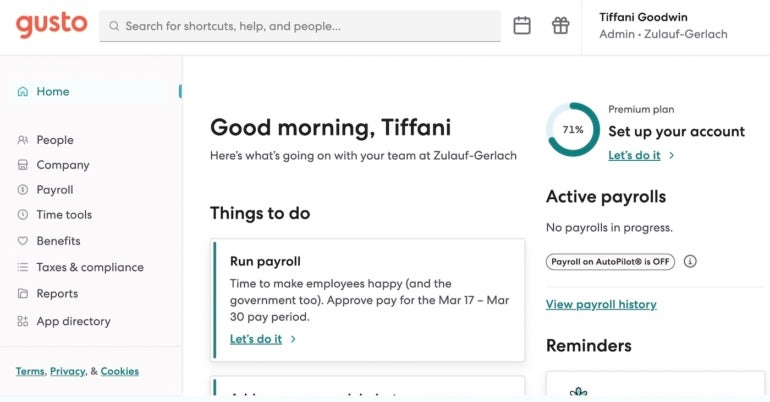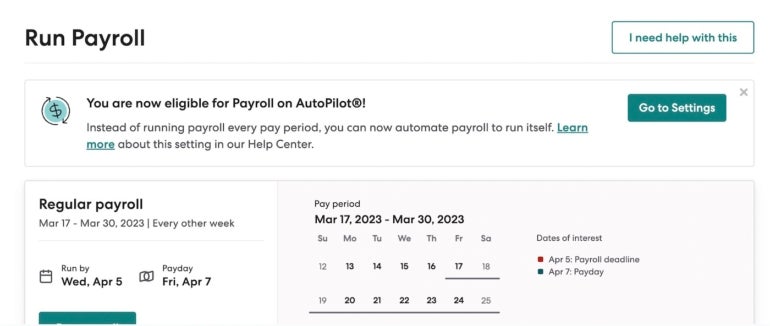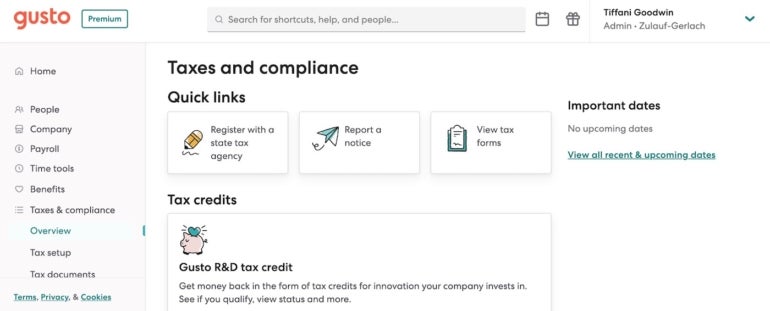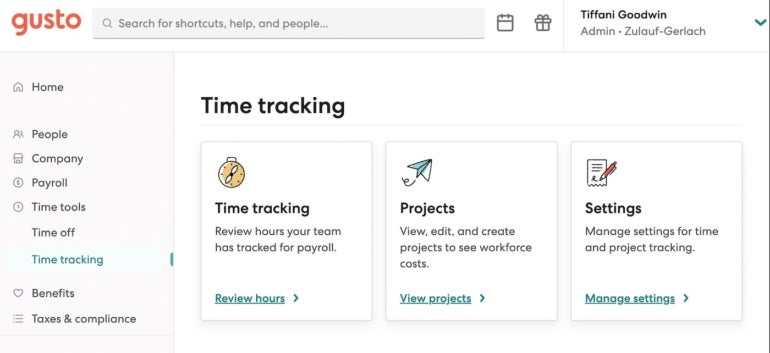Gusto Review (2023): Pricing, Features, Pros and Cons
Jump to:
What is Gusto?

Gusto is payroll software with features that can be used by budding small businesses and well-established enterprises. It was formerly known as ZenPayroll.
Get the rundown below, and see if Gusto might be ideal for your business.
What are the pros of Gusto?

Whereas some payment software only manages payments, Gusto handles employee benefits, time clocks, taxes and hiring. Its all-in-one system allows accountants and bookkeepers to perform all necessary admin in one location, instead of increasing app stacks for a company. Because of its streamlined approach, users save at least five hours per month administering payroll, saving companies money.
Gusto takes pride in its honest pricing. The company aims to have transparent pricing with no hidden or unexpected fees to users throughout the payroll process.
What are the cons of Gusto?
Compared to other payroll products, Gusto isn’t the cheapest option; however, the price could be worth it, given its extensive resources.
Though Gusto has standard benefits offerings, they are exclusive to price tiers and aren’t as expansive as they could be. For example, some customer reviews complain that customer support isn’t accessible during the weekend. Additionally, customizable benefit options give employers more opportunities to individualize perks for their workers. With Gusto, employers are sometimes unable to offer such perks to employees.
Another common complaint among users is that Gusto’s integration with QuickBooks can be clunky and time-consuming to set up for optimal use.
How much does Gusto cost?
Gusto has pricing plan options depending on your needs. Prices are subject to change depending on sales and special offers, which Gusto offers regularly.
- Simple: The plan starts at $40 and requires an additional $6 per payee.
- Plus: The plan starts at $80 and requires an additional $12 per payee. Gusto is currently offering 25% off its Plus plan for the first six months. This promo ends April 30.
- Premium: This plan’s pricing is case specific, so reach out to Gusto. Features with this plan include compliance alerts and special expert access that other plans do not have.
- Contractor Only: The plan has no base pay for six months, and then it increases to $35. It costs $6 per contractor. This plan supports over 80 countries.
How does Gusto work?
Gusto has a long list of features. Here are some highlights that make it a payroll system to consider:
Payroll and direct deposit

The Gusto interface reminds employers when payday approaches. On payday, it lists every employee so employers can verify the correct hour input and direct deposit amounts. The program ensures employers provide adequate compensation and can administer raises and wage adjustments. It’s all in one simple location with a straightforward design for easy comprehension.
Assuming each employee has submitted direct deposit information, Gusto automatically distributes funds in just a few clicks. For more traditional paycheck receivers, Gusto can even assist in printing physical checks.
Employee benefits
Benefits include more than just healthcare — Gusto also offers retirement and investment opportunities for employees. The software bundles benefits in cost tiers, including no-cost, low-cost and premium. Some of these benefits include:
- Renewals during open enrollment periods.
- Paycheck splitters.
- HSAs and FSAs.
During payroll submission, the system automatically considers benefit deductions, so an extra step isn’t required for employees.
Talent management, hiring and onboarding
Gusto offers the option to create straightforward job postings and keep track of incoming applicants, alongside the number of people interviewing for a position. Talent acquisition is challenging enough for teams to manage, but Gusto provides resources for the entire process. With easy-to-follow checklists for onboarding, applicants and employers, Gusto helps ensure all forms are digitally signed and stored, and never forgotten in the backs of dusty filing cabinets.
Filing taxes

Gusto has the option to toggle reminders for tax regulations. If laws change in your region, even if it isn’t tax season, Gusto will notify you, so your business remains compliant. After payroll submits, Gusto automatically files and sends payroll taxes, so you don’t have to concern yourself with security issues or human error. Gusto neatly organizes all tax forms in one place, including I-9s, W-2s and contractor forms.
Time-tracking and attendance

Gusto’s time-tracking feature automatically applies to every employee or contractor. However, it also syncs with most other time-tracking software for easy integration, including Homebase and When I Work. Plus, workers can use Gusto’s features to request time off or time-track project-specific tasks.
Other notable features
Gusto has many other features, but a few notable ones include streamlining HR tools and workers’ compensation.
Gusto’s HR experts are available for Plus and Premium plans, who can help businesses ensure compliance, such as with OSHA standards, and organize lawsuits. Gusto also has templates for countless HR forms that would otherwise need drafting from scratch, including offer letters and evaluations.
The program allows businesses to pay for workers’ compensation benefits overtime, integrating coverage with the platform for a pay-as-you-go structure instead of massive lump sum payments.
Gusto also offers a customer service helpline that users can contact to resolve any other questions.
What are alternatives to Gusto?
Gusto isn’t the only payroll software on the market, and its main competitors may have something your business needs that Gusto doesn’t offer.
QuickBooks Payroll
QuickBooks and Gusto share many similarities, including employee portal access and tax-filing assistance. The differences are minimal, and it may come down to trying a trial period for both and determining which interface your business likes best. When analyzing prices, QuickBooks Payroll is similar to Gusto, with a $45 fee and $4 per person.
SEE: Gusto vs QuickBooks Payroll (TechRepublic)
ADP
When analyzing price, ADP comes out on top with the Essential plan pricing, with a $29 startup fee and $5 per employee. For its higher tier plans, ADP requires the extra effort of requesting a quote. However, ADP also offers same-day direct deposit and specialized 24/7 support features for each subject area of its services, including onboarding and unemployment insurance consulting.
SEE: ADP vs Gusto (TechRepublic)
Paychex
The price for Paychex is higher than Gusto, with a $59 base fee, but only $4 for additional payees. You might be able to justify the base price depending on how many people are on your payroll. It may be worth it because Paychex has a 24/7 customer service line, which Gusto can’t compete with.
While Gusto offers numerous services included in the base pay, Paychex offers flexible plans with add-ons, making the service more customizable for individual companies, but Paychex could offer more features upfront in standardized plans. Alternatively, it ensures businesses aren’t paying for services they don’t use.
SEE: Gusto vs Paychex (TechRepublic)
Is Gusto worth it in 2023?
With its comprehensive features and expansion possibilities, Gusto is one of the top contenders in online payroll. Though other payroll software may have different and equally useful tools, it ultimately all comes down to what your company needs.
Review methodology
This review was conducted using personal experience with business software and technology, as well as information provided via vendor websites and relevant databases.
For all the latest Technology News Click Here
For the latest news and updates, follow us on Google News.
